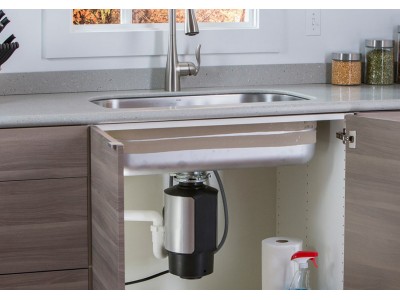With the increasing popularity of food waste disposers, such as the models offered by the LEOMIKAO online store, the importance of proper operation and maintenance is becoming increasingly relevant. These devices not only help reduce waste in the kitchen, but also contribute to improving the environmental situation. However, in order to ensure reliable operation and increase the service life of the disposer, owners need to follow a number of important recommendations. In this article, we will discuss in detail how to properly operate and care for food waste disposers.
Why use a food waste disposer?
Food waste disposers are becoming an indispensable kitchen tool. Their use significantly reduces the amount of waste sent to landfills and reduces unpleasant odors. These devices gradually break down food scraps into small particles, which are then safely disposed of through wastewater systems.
How to choose the right disposer?
Before delving into the operating and maintenance instructions, it's important to understand how to choose the ideal food waste disposer. Key features to consider:
1. Power: The higher the power, the more types of waste the disposer can handle.
2. Installation type: Disposers come in overhead and underhand installations. The choice depends on user preference and available space.
3. Noise level: Modern models offer quiet operation, so consider the noise level when purchasing.
4. Warranty and service: Find out about the warranty terms and service options.

Now that you've chosen your disposer, let's move on to the basic operating instructions.
Operating a Food Waste Disposer
1. Ensure Proper Installation

Proper installation is the first step to successful operation. Follow the manufacturer's instructions and ensure the unit is connected to a power source and drain. If necessary, seek professional assistance.
2. Avoid Overfilling

It's important not to overfill the disposer. Excessive food waste can cause clogging or damage. It's recommended to fill the disposer gradually, using it several times if you have a large amount of waste.
3. Separate waste types

Not all foods should go into the disposer. Avoid adding hard objects (such as bones or nuts), large vegetables (such as whole potatoes), and fats and oils. These can damage the mechanism.
4. Use water during operation

Always run cold water when using the disposer. This will help properly lubricate the mechanism and prevent clogging. After use, let the water run for a few seconds to clean the system.
5. Do not run the disposer with an empty bowl

Running the unit without food can damage it. Make sure there is at least a small amount of food residue in the disposer before turning it on.
Caring for Your Food Waste Disposer
Properly caring for your disposer will ensure its long-term operation and minimal problems. Here are some maintenance tips:
1. Regular Cleaning
Regular cleaning of your disposer is very important. You can do this using these simple methods:
- Ice and Salt: Place a few ice cubes with a handful of salt in the disposer. This helps remove grease and other residue from the blades.
- Lemon Peels: Adding lemon peels not only helps clean the unit but also kills harmful bacteria and eliminates unpleasant odors.
2. Check for Damage
Periodic inspection of the unit for damage or loose fasteners. If you notice a change in the operating sound or the disposer's performance is reduced, service may be required.
3. Scheduled Maintenance
Depending on your disposer model, perform scheduled maintenance once a year. This may include cleaning the internal parts and replacing worn components. It's best to have this task performed by a professional.
4. Avoid Chemicals
Avoid using harsh chemicals to clean the unit, as they can damage the internal components and impair the disposer's performance.
Frequently Asked Questions
How often should I clean my disposer?
We recommend cleaning it regularly at least once a month. More frequently during heavy use.
What should I do if my disposer is clogged?
If you notice your food waste disposer isn't working, try unplugging it, checking for blockages, and clearing them using the special tool usually provided with the device.
Can I dispose of bones and hard vegetables?
No, many food waste disposers are unable to handle hard materials like bones or hard vegetables. Always check the manufacturer's instructions for recommendations.
Conclusion
Proper use and maintenance of your food waste disposer not only helps extend its lifespan but also ensures its performance. By following these tips, you can create a clean and safe kitchen while promoting eco-friendly waste management. If you don't have a food waste disposer yet, check out the wide selection of models in the LEOMIKAO online store—we'll help you choose the best option for your needs.







